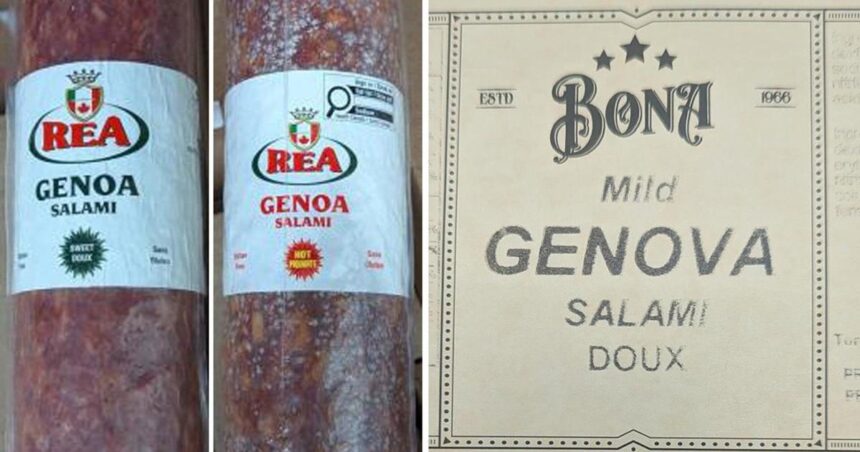I stepped off the ferry to Granville Island on a crisp October morning, joining a scattered crowd of weekend shoppers at the public market. The usual bustle around artisanal food stalls had thinned noticeably, especially at the normally packed charcuterie counter where Paolo Gatto has sold his family’s cured meats for eleven years.
“First time in a decade I’ve had to pull product from the shelves,” Paolo told me, gesturing to the half-empty display case where his salami selection typically overflows. “Some of these recipes go back to my grandfather. But when health comes first, there’s no question about what to do.”
Paolo’s experience mirrors a larger crisis unfolding across Canada. The Public Health Agency of Canada confirmed yesterday that 72 people have fallen ill with salmonella infections linked to specific salamis and dry-cured sausages. The outbreak spans five provinces, with cases concentrated in Ontario and Quebec, but reaching westward to British Columbia and eastward to Nova Scotia.
Behind these numbers are real people like Marissa Chen, a Vancouver teacher who spent three days in hospital after consuming contaminated salami from a grocery store deli platter. “The fever hit 103, and the cramping was unbearable,” she recounted, still looking pale as we met at a coffee shop near her apartment. “I’ve never experienced anything like it.”
The Canadian Food Inspection Agency began issuing recalls in late September, initially for specific product codes from Venetian Meats based in Hamilton, Ontario. As testing continued, the recall expanded to include products from three additional manufacturers with distribution networks spanning the country.
For small producers like Paolo, who source their meats from larger distributors before applying family recipes, the situation highlights the interconnected vulnerability of our food systems. His products weren’t part of the recall, but customer hesitation has affected all sellers of similar products.
Dr. Jasmine Patel, an epidemiologist with the BC Centre for Disease Control, explained how challenging these investigations can be. “With salmonella, symptoms typically appear 12 to 72 hours after consumption, but people might not connect their illness to something they ate days earlier,” she said during our phone interview. “Plus, many cases go unreported as people recover at home without seeking medical attention.”
The current outbreak strain – Salmonella Typhimurium – is concerning health officials because of its resistance to two commonly used antibiotics. This pattern of antimicrobial resistance complicates treatment for severe cases, particularly among vulnerable populations like the elderly, young children, pregnant women, and those with compromised immune systems.
Tracing contaminated food sources involves intricate detective work. Investigators from provincial health authorities collaborate with federal agencies, reviewing purchase receipts, interviewing patients, and conducting extensive laboratory testing to establish definitive links between illnesses and specific food products.
While at the BC Centre for Disease Control offices in Vancouver last spring for an unrelated story, I observed the meticulous work of their food safety lab. Technicians worked with minute samples, carefully cataloging and testing for various pathogens. That same precision is now being applied to track this outbreak to its source.
“The challenge with dry-cured products is that the manufacturing process itself doesn’t always eliminate salmonella,” explained Dr. Harold Wong, a food microbiologist at the University of British Columbia. “The bacteria can survive in low-moisture environments, and if contamination occurs early in production, the traditional curing process might not kill all pathogens.”
The Canadian Food Inspection Agency maintains that Canada’s food safety system remains among the strongest globally, despite this outbreak. Their records show that contamination incidents have actually decreased over the past decade, though detection methods have simultaneously become more sensitive.
At Trout Lake Farmers Market the following weekend, I noticed something encouraging. While shoppers were asking more questions about food origins and preparation methods, they weren’t avoiding local producers. Instead, many seemed to be seeking closer connections to their food sources.
Carmen Wakefield, who operates a small-batch charcuterie business at several Vancouver farmers markets, has spent more time than usual talking with customers about her production methods. “People want to know everything – where I source the meat, how it’s processed, what safety measures I take,” she said while carefully wrapping a piece of coppa for a customer. “It’s time-consuming but important. Trust is everything in this business.”
This sentiment echoes throughout Canada’s artisanal food community. The Canadian Artisanal Charcuterie Association released guidance to its members last week, emphasizing transparency with customers and encouraging enhanced testing protocols beyond regulatory requirements.
For consumers, health authorities recommend several practical steps to reduce risk: check the Canadian Food Inspection Agency website for current recalls before purchasing or consuming dry-cured meats; store these products at proper temperatures; use separate cutting boards and utensils for ready-to-eat foods; and wash hands thoroughly before and after handling any food products.
Those who experience symptoms of salmonella infection – including fever, chills, diarrhea, abdominal cramps, headache, nausea, or vomiting – should contact their healthcare provider, especially if symptoms are severe or persist beyond a few days.
As I walked through Granville Island Market one last time before heading back to file this story, I noticed Paolo deep in conversation with a long-time customer, explaining his additional safety measures and showing her test results from his recent batch of soppressata. It was a small moment that captured something essential about our relationship with food and those who provide it – a delicate balance of tradition, trust, adaptation, and care that continues even as we navigate the uncertainties of modern food systems.






